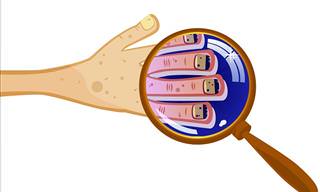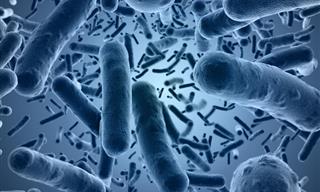I may or may not have empathizers out there, but nail-biting, known in medical terms as Onychophagia, is a habit that consumes a whopping 20-30% of the human population, including 45% of teenagers at any given point. As a fellow nail-biter, I couldn’t help but wonder if there’s more awfulness to this bad habit than my mother’s lectures and dirty looks from colleagues. As it turns out, nail-biting can be dangerous not only to your social standing but also to your health. We’ve listed here for you some of the major reasons why.
1. Germs, germs, and germs!

Your fingers are already a magnet for every kind of germ out there, picking up bits and pieces of every single place, person and thing you encounter. Now, the biggest remedy for that is simply washing your hands with a little bit of soap.
However, regardless of how much you wash your hands, your fingernails continue to gather, collect and store dust, dirt, and grime that can be much harder to remove, even for the diligently clean souls. Every time you bite your nails, you are likely ingesting most of these germs, which can then cause throat and gum infections and more.
2. Avoid the infection

Speaking of infections, the various kinds of germs gathering under your nails can be of a more complex variety. You would think that a habit like nail-biting would be relatively harmless besides a few throat infections. Unfortunately, these germs under your nails may also be capable of causing far more serious ailments like salmonella and E Coli, which result in severe gastrointestinal distress and give your entire system a major upheaval.
3. Watch out for HPV

Still, along the same lines as the above two points, another infectious disease hiding under your fingernails is the illness known as Human papillomavirus (HPV). For those who bite their nails day in and day out, this is an ailment that you’ll definitely want to be careful of.
It can be identified by the unique and somewhat painful warts that tend to grow on the fingers of the affected person. This virus can be especially dangerous because, once warts begin to grow on your fingers, they can spread to your mouth and lips if you continue to bite your nails.
4. Protect your teeth

Believe it or not, your nails are a lot tougher than you realize. For a nail biter who is constantly chewing on his or her fingers, not only does the calcium in your nails get worn down, but the calcium in your teeth does as well. Constant nail-biting can weaken your teeth severely and may even cause them to shift position and protrude awkwardly and sometimes even painfully.
Much like with thumb-sucking, the alignment of the top and bottom rows of your teeth may also be negatively affected by this habit, which may become more prominent when you bring the two rows of teeth close together. Nail-biting can also drastically wear down your molars.
5. Restricted movement

Our hands are often the cornerstone of our very existence. We need them to do almost everything in our day to day lives from cooking and cleaning to driving. For someone in the habit of nail-biting, there's always one hand to be used for work while another one is being consistently chewed on.
In simplest terms, if one hand is always ending up near your mouth, that's one less hand you have to get things done with. In the case of some extreme nail-biters who may bite their nails down to a nub, the pain caused by the bad habit can even limit the use of your hands.
6. Biting beyond the nail

Since we're on the topic of extreme and excessive nail-biting, sometimes it's hard to know when to stop. It'll start with biting the tips of your nails, but often when there's no nail left, many with this habit may end up biting the skin around their nails.
This can be especially dangerous as it can create open wounds on your fingers that are extremely susceptible to the collection of germs and infections, such as paronychia, which could potentially lead to septic arthritis. So it's important not to let this bad habit progress beyond a certain point.
7. Your immune system takes a hit

The constant intake of germs experienced by most nail-biters can do some damage to your immune system. It was observed by an intern at Orange Coast Memorial Medical Center in California that all the bacteria on our hands, whether from doorknobs or toilets, increase your exposure to the flu and fevers, and on rare occasions, even more serious illnesses like hepatitis.
People who habitually bite their nails are known to experience the common cold more frequently than persons who don’t bite their nails. While the common cold is not particularly threatening on its own, continually being infected with a cold can weaken your immune system and leave you open to more dangerous ailments.
8. Mental health risks

One of the biggest hurdles that a habit like nail-biting can leave you facing is a serious mental issue. It was determined by the American Psychiatric Association in 2012 that nail-biting is a symptom of OCD (obsessive-compulsive disorder).
Nail-biting is believed to be another manifestation of OCD, much like compulsive cleaning and repetitive counting. It’s important to keep in mind that such compulsions tend to worsen over time and often can escalate to far more detrimental behavior like skin picking and hair-pulling. However, you can rest easy knowing that there are a few simple solutions to overcome this nasty habit!
Related Articles:
10 Natural Ways to Fix Brittle Nails
Surprising Uses of Nail Polish Remover
15 Warning Signs from Your Nails
 Go to BabaMail
Go to BabaMail

























































